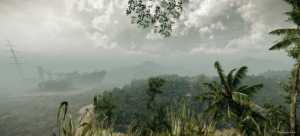“I held out my hands. The grey creature in the corner leant forward… He put out a strangely distorted talon, and gripped my fingers. The thing was almost like the hoof of a deer produced into claws. I could have yelled with surprise and pain. His face came forward and peered at my nails, came forward into the light of the opening of the hut, and I saw with a quivering disgust that it was like the face of neither man nor beast…” (44).
This passage is taken from the scene in The Island of Dr. Moreau by H. G. Wells in which Prendick is getting his first introduction to the “Law.” Prendick is brought to the cave where all of these creatures live and offered food before they recite to him this set of rules all of the creatures live by. This initial hospitality shown by the creatures makes Prendick comfortable enough to “hold out [his] hands.” In doing so, Prendick accepts the hospitality so kindly offered by the creatures. Because the act is voluntary on Prendick’s part, he is able to begin to connect with the beasts on his terms in a nonviolent manner. Additionally, the grey creature “gripped” Prendick’s fingers. The act of “gripping” rather than simply holding his hand attaches a desperate quality to the action. The creature needed to hold Prendick’s hand, and maintained a strong enough grip so that Prendick couldn’t easily break the connection. It is important to note here that this is one of the first times Prendick uses person-specific pronouns rather than neutral pronouns in regards to these creatures, signaling first signs of Prendick accepting the creatures as some form of human. This new use of pronouns coupled with his offer to touch the beast and the beast’s enthusiastic response makes for a fantastically human moment between Prendick and beast. It was as if the beast had been waiting to touch someone for so long, and Prendick, despite his disgust and preconceived assumptions, gave the beast that moment. This openness toward the beasts only grows within Prendick as the story progresses.
It cannot go unnoticed, however, that Prendick still harbors more hate towards the beasts in this passage than anything else. He remains open to the idea of the beast in the beginning of the passage, but the beast is still shrouded by the darkness of the cave. It isn’t until the beast “come[s] forward into the light of the opening of the hut” that Prendick becomes openly hateful in his account of this scene. Prendick “quivers” with disgust, suggesting he is so shocked by what he sees he has a physical reaction. “Disgust” is so severe in nature it signals the idea that Prendick isn’t simply uncomfortable with these creatures, but rather physically repulsed. He can’t even be in the same room as them, let alone touch them. Moreover, the introduction of light to the space is also the same instance in which Prendick stops using person-specific pronouns, reverting back to the use of “it” when referring to the beast. It is also the moment in which Prendick makes the clear distinction that the creatures are not “man.” In the same passage, Prendick recognizes the human qualities of the creatures, but also yanks those human qualities away in an instant.
Damrosch and Dettmar note in their section titled “The Age of Energy and Invention” the speed with which science advanced in the late Victorian era. As quoted by W.R. Greg, speed was the “most salient characteristic of life” during this later section of the Victorian era. The way in which the beast’s appendage is described, as a mixture of hand, claw, talon, and hoof, conjure images of science moving so fast that the appendage did not have enough time to decide what it was going to develop into. This, coupled with the speed with which Prendick gives human qualities to the beast only to take them away in a matter of seconds, allows this passage to act as a warning. It influences readers to reflect on themselves and what humanity and science looked like during that time. It begs so many important questions to be asked: How far will we let science interfere with humanity? Where is the line between animal and human? Is all science good science? This passage warns against taking science too far, but suggests that perhaps no matter the speed of advancement, some form of humanity will prevail.

